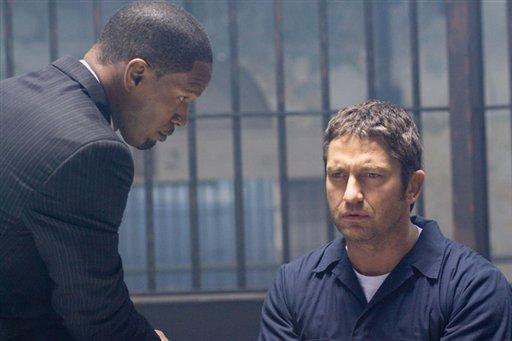Two films — one playing in cinemas and another recently released on DVD — tackle the relationship between law and justice, prison and freedom.The first one, “Law Abiding Citizen,” now in theaters, is a revenge flick starring Gerard Butler (“300”), and Jamie Foxx (“Ray”).Clyde Shelton’s (Butler) home is invaded by two burglars who kill Shelton’s wife and daughter. After their arrests, one of the suspects agrees to testify against the other for a plea deal. Hotshot Assistant District Attorney Nick Rice (Foxx) makes the bargain without consulting Shelton, who, not surprisingly is devastated. The stage then gets set for a highlight reel of biblical barbarism. Ten years later, all the players in the Shelton saga are being knocked off in horribly inventive ways. Shelton is arrested for their murders and remains in custody, but the bodies keep falling. The prison walls seem incapable of damming Shelton’s bloodthirsty quest for closure. “Law Abiding Citizen” is in love with its mayhem and gets self-indulgent with its use of violence. But it’s a satisfying thriller on the whole — predictable, but suspenseful until it careens into a formulaic ending. Unlike other films in the genre — for instance “Taken” or “Kill Bill” — it’s interested in more than just kills. “I want you to see the principle,” Shelton informs Rice.Shelton philosophizes with a shotgun. “I will bring this whole system down you,” he bellows. The film glances at our legal infrastructure and wonders whether one could reliably find justice through a court sentence. Can a 20-year jail term excluding parole make up for the loss of a loved one? In a sense, “Law Abiding Citizen” has an uncanny resemblance to the exemplar of all revenge fantasies, “The Count of Monte Cristo.” Shelton began as Edmond Dantes, but returned as the Count, the mysterious avenger with unlimited resources.Like “Law Abiding Citizen,” “Hunger,” a film by first-time British director Steve McQueen, deals with men in prison. It’s easily the most interesting film I’ve seen this year.In the ’70s and ’80s, British soldiers imprisoned Irish Provisional Army members during the Northern Ireland conflict. By 1981, several inmates staged a hunger strike to protest conditions in prison and also to gain status as political prisoners. “Hunger” focuses on four characters: a prison guard, two IRA inmates and IRA leader Bobby Sands. Like Gillo Pontecorvo’s “Battle in Algiers,” “Hunger” is unafraid to show those brutal deeds engaged in by the good guys in the pursuing justice and maintaining law and order. We see the poop-infested cells, the anxiety on the faces of the guards and the indescribable tedium of solitary confinement. McQueen displays impeccable style and is in complete control of the visual medium. From the composition of the shots to the deliberate pacing of the camera as it dutifully tracks along its subjects to the long takes, which seem to meditate on the images, he clearly has an eye for detail. There is a wonderful rhetorical face-off during which Sands and a priest debate the use of starvation as a form of protest. The scene is medium shot and for the most part done in one take — moments like these are the reasons movies are made.”Hunger” doesn’t purport to tell the whole truth about these men or the history that looms above their circumstances. It is interested only in portraits, not full-life shots. Sands’ example shows man retains his freedom even when in chains. So while Sands is shown in a favorable light, it needn’t negate the impact of his crimes — it is possible to respect a man’s convictions, even when we consider them distasteful. The film is relevant in the light of our decision to try Guantanamo Bay inmates on mainland America. Do these enemy combatants deserve the umbrella of American justice? Should the habeas corpus apply to them? Some people don’t think so, hence the similarity between “Hunger” and “Law Abiding Citizen.” There are times when justice can only be found beyond the law.—-Contact Freke Ette at [email protected] Ette is a political theory graduate student from Uyo, Nigeria. Follow him on Twitter @TDR_fette.
Freaky Friday: Films tackle relationship between law and justice
October 23, 2009








